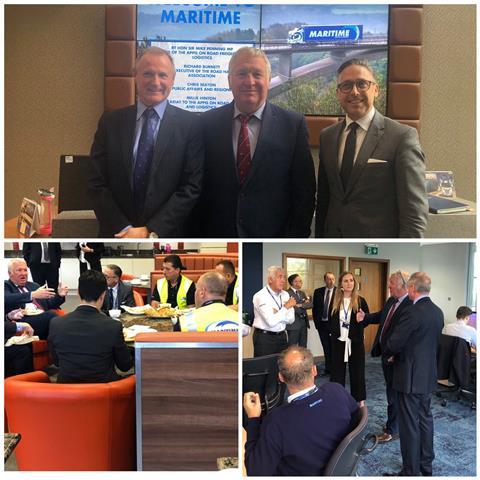
It is now one year since Sir Mike Penning MP set up a new all-party parliamentary group (APPG) on road freight and logistics with three primary goals: to help ease the chronic shortage of HGV drivers; improve the image of the industry in the eyes of the public; and give logistics a higher profile within government.
At the time Sir Mike pledged he would “walk away if it just became a talking shop” and one year on says he is satisfied with progress. “It hasn’t,” he says. “It has actually made a difference.”
One key achievement has been the delivery to government of a report calling for seven key actions to support the logistics industry and the national launch of the Road to Logistics programme created by the RHA and Microlise with £1m funding from the DfT.
RHA chief executive Richard Burnett was instrumental in the creation of the APPG and has worked closely with Sir Mike on making sure it delivers on its promises.
“The APPG is starting to do what Mike set out to achieve,” says Burnett. “It has been a slow start but that is more to do with the political back drop. Mike has been working closely with us and I don't think we would have got Road to Logistics over the line if we hadn't had the support from Mike.
“Under Theresa May it was incredibly difficult but since the arrival of Boris there has been a stepchange in how we are engaging with government. [Transport secretary] Grant Schapps is like chalk and cheese compared to [his predecessor] Chris Grayling. The new team get it. The previous government was so focused on Brexit and so intransigent in what they have been doing that it was difficult to move things forward.”

Road to Logistics is a not-for-profit joint venture between the RHA and Microlise designed to get people including service leavers, ex-offenders and the long-term unemployed behind the wheel, changing lives while addressing the driver shortage. It will help break the funding logjam by getting access to some of the money that the transport sector has paid in the widely despised Apprenticeship Levy.
“Mike has spent a lot of time out in the industry – we went to see Maritime and Mike had a really great meeting with [the MD] John Williams about the driver shortage, the Apprenticeship Levy and the big issues around the pool of money that has been created,” says Burnett. “Of the £280m that we as a collective industry have paid in we have only accessed £20m.”
While the combination of the APPG and a new transport secretary appears to raised the profile of the industry with government – undoubtedly helped by the increasingly feverish no-deal Brexit preparations - getting customers and the wider public to see the value of logistics may take longer. It could be said that the skills shortage is more a result of low levels of operator profitability keeping a lid on driver and warehouse operative wages than a shortage of funds for training.
“The manufacturers and retailers have screwed the logistics industry into the deck over the years,” argues Burnett. “We went from reasonably profitable rates to marginal rates where you have to drive the efficiency of the operation just to survive. The big PLCs scoop off the top of the rates to create more profit for themselves and subcontract down the food chain so the smaller operators make less money.
“There has to be a fundamental change and the market has to prevail – what is a reasonable wage for an HGV driver these days? Is it £55,000? If that's what we have to pay to retain people then the manufacturers and the retailers are going to have to wake up to the true cost of distribution. We have the push the message that we won't be able to sustain this unless you recognise the true cost.
“It will be supply and demand and, if we end up where we don't have sufficient drivers, costs are going to increase and it will get to the point where people will just have to pay more.”
Paying more is only one part of encouraging more young people into the industry – first they have to know the industry exists and offers good career opportunities.
“That is a long, slow burn and is not something that will happen overnight,” says Burnett. “That's about us bringing the industry together to do more. We've got to clean up our act but that comes back to money. How do we get cleaner, newer trucks? That also comes down to rates and people accepting that the cost of distribution isn't cheap. We also have an element of the disruptors like Google and Amazon where people are buying more online and we are seeing the death of the high street.
“The public needs to understand that it is their own behaviour that is driving the need for more vans and trucks. We have a lot of work to do on this but with everyone focused on Brexit and not on the things we need to change it is a difficult challenge.”













